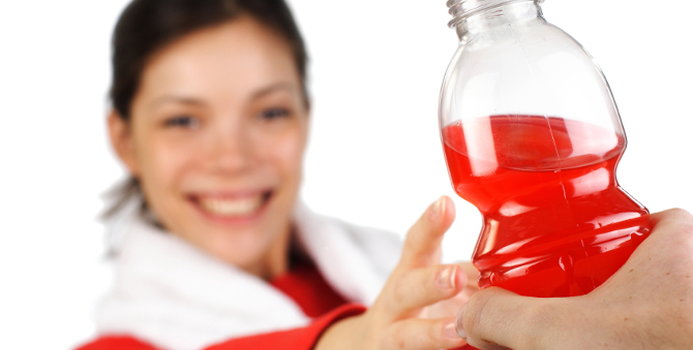Caffeine has been shown to improve athletic performance in a number of ways. In endurance runners, it helps fight mental and muscle fatigue. In shorter aerobic activities, caffeine helps muscle cells to contract more forcefully, producing more power and cutting down on lactic acid buildup. Timing is important. A cup of coffee two hours prior to working out isn't going to help that much, nor will a caffeinated soda do that much for you halfway through a 5k race. It's also good to remember that caffeine has no calories of its own, so you need to consider the vehicle it's delivered in as well as the timing. Sports drinks with caffeine have been introduced to address both concerns.
How Sports Drinks Work
Sports drinks were originally designed to help keep athletes hydrated and to replace electrolytes lost during exercise, with some carbohydrates thrown in for an extra glucose boost in the bloodstream. They were meant to be sipped on throughout a game, which is why sodium is present in them. Yes, sodium is an electrolyte, but - more importantly - it triggers the thirst mechanism, which leads to a lot of sipping, keeping an athlete hydrated. Though the formulation varies from brand to brand, the electrolyte replacement itself is not much of a benefit unless an athlete has been sweating profusely for about 4 hours. The glucose provided by the carbohydrates is more important, providing extra energy for the muscles and delaying the onset of fatigue. This is where caffeine comes in, and why it is increasingly a common addition to sports drinks.
Caffeine and Glucose Absorption
Caffeine slows down the breakdown of glycogen in the muscles - what glucose in the bloodstream gets converted to, and what your muscles use for energy. The longer this process takes, the longer your body has to provide your muscles with extra glucose before their tanks run dry. But that's not all. A study on cyclists at the University of Birmingham found that caffeine acts to quicken the rate of glucose absorption by the body. What this means is that caffeine not only slows down the rate at which your muscles use up their energy, it speeds up the rate at which the body delivers new energy to them.
The manner in which the U of B study was conducted is also important. Rather than giving the participants a single large dose of caffeine in the hour leading up to the exercise, doses of a glucose and caffeine mixture were given to the cyclists at regular intervals. In other words, study participants took sips of the mixture during the entirety of the exercise, just as they would a sports drink. All that was missing were the electrolytes. A similar study with actual caffeinated sports drinks found that they reduced strength loss when compared to water and non-caffeinated sports drinks by two-thirds.
So, yes, sports drinks with caffeine do seem to be a good idea, when used as sports drinks are meant to be used: sparingly, and over time. Take care to examine the nutrition labels on them as well. Carbs are good, but more than you need are not, and some "energy" drinks will deliver the caloric equivalent of 6 to 7 doughnuts, which is more than anyone needs.



